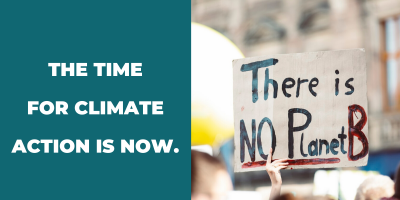1000 Friends of Oregon supports Governor Brown’s March 10, 2020, Executive Order on climate change. Greenhouse gas (GHG) emissions accelerate climate change and pose a significant threat to Oregonians’ public health and our state’s natural resource economies.
Climate change contributes to an unstable Oregon: it increases the frequency and severity of wildfire, accelerates drought conditions, causes sea level rise and affects all sectors of our economy. Changing climate conditions require that climate action be prioritized to help vulnerable populations and impacted communities adapt. Our land use planning system is intended to ensure economic and environmental health, and meaningful climate action is necessary to defend the health and future of Oregon.
The Governor established science-based goals of GHG emission reductions of 45% below 1990 levels by 2035, and 80% below 1990 levels by 2050. Each economic sector has a responsibility to contribute to these goals, and we are encouraged that this executive order directs state agencies to take meaningful action in pursuit of the goals.
As the Executive Order recognizes, almost 40% of Oregon’s greenhouse gas emissions come from the transportation sector, and our transportation systems are tied to — and rely on — land use planning. Therefore, 1000 Friends of Oregon plays a unique role in advocating for transportation systems that create healthy, livable, climate-resilient communities. We advocate for diverse multimodal transportation options that get people where they need to go in safe, efficient, and climate-friendly ways like this executive order is directing.
1000 Friends strongly supports the Governor’s directive to the Land Conservation and Development Commission (LCDC) that it “prioritize and expedite” amending its transportation planning rule to ensure that the state’s eight major urban areas make changes to their transportation plans to meet GHG reduction goals that have been assigned to them for almost a decade. The Governor further directs the Departments of Land Conservation & Development (DLCD) and Transportation (ODOT) to provide these local governments the financial and technical assistance to carry this out.

The Governor states that these actions should be implemented “at the highest level within the agencies” and “to the full extent allowed by law.” Fortunately, at its regular meeting on March 19, 2020, LCDC can and should take immediate action. It already has the topic of transportation planning to reduce GHG emissions on its agenda, and requiring metropolitan transportation plans to meet GHG reduction targets is clearly within LCDC’s existing legal authority.
1000 Friends supports the Governor’s recognition of the key role that Oregon’s natural and working lands agencies and industries can play in sequestering carbon and planning for the impacts of climate change.
Climate-smart land use and natural resource management requires that our state agencies exercise all authority to achieve GHG emission goals by working with Oregon’s rural industries to find real science-based solutions. We support the directive for the Oregon Global Warming Commission to develop goals for carbon sequestration and storage through Oregon's natural and working lands based on the best available science. This will allow Oregon to move forward with data-driven targets, and ensure we utilize our natural resources to the greatest extent possible to achieve climate resiliency.
It’s essential that Oregon acknowledges the sequestration that our natural resource economies have already achieved, and continues to take meaningful steps towards climate resilience. Oregon’s farmers, ranchers and foresters need meaningful state-managed offset programs that are workable and accessible to farms of all sizes. Funding should be allocated through easy-to-navigate incentive programs that reduce emissions and ensure long-term success for the state’s natural resource stewards.
Oregon’s forests are already showing altered distributions of many plant species, longer fire seasons, and higher numbers of wildfires than in the past due to climate change — These repercussions of the shifting climate impact the state’s economy and public health.
Oregonians must plan together for a more secure climate future, including with state agencies. This executive order is the right step forward, and continued climate action must be an ongoing conversation to ask what each Oregonian can do to reduce their emissions. We thank Governor Brown for her leadership on climate action and look forward to agency reports on proposed actions to reduce GHG emissions and mitigate climate change impacts.
